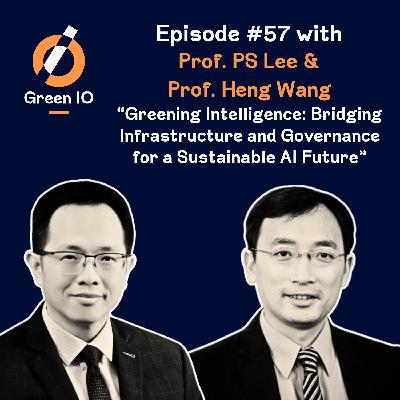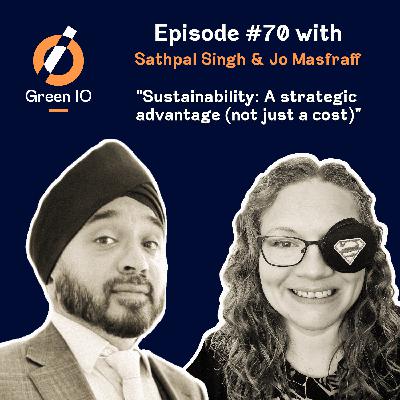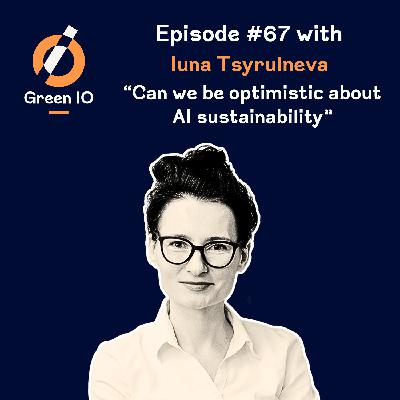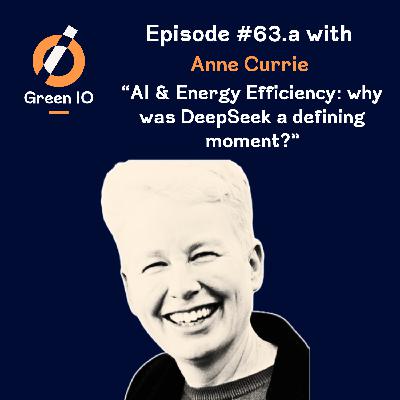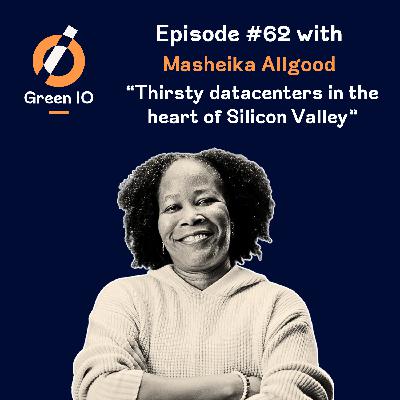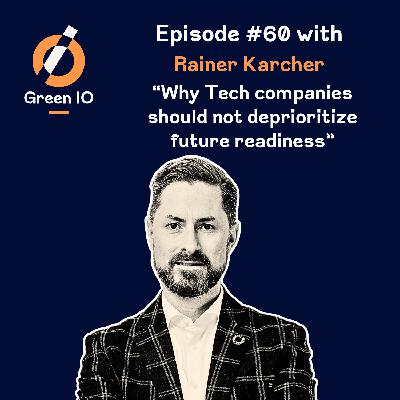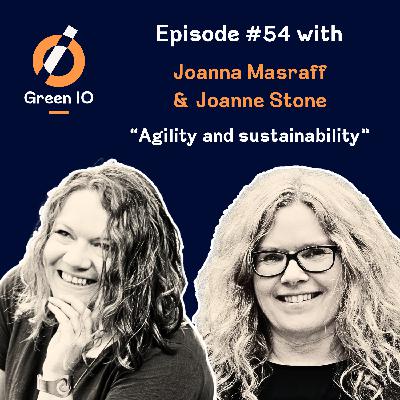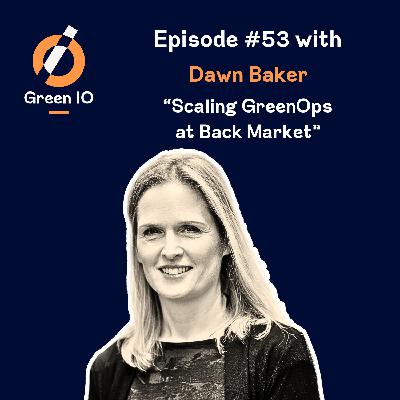#57 Greening Intelligence: Bridging Infrastructure and Governance for a Sustainable AI Future with Pr. PS Lee and Pr. Heng Wang
Update: 2025-04-29
Description
Description
“It's always a case of fit for purpose, or what we call a proper engineering.”
Some down-to-earth facts and analysis were coined by Pr PS Lee, one of the world's top experts in liquid cooling - and Pr. Heng Wang - a renowned expert in digital governance - while cross-analysing Singapore’s main challenges from an infrastructure and governance perspective of the ongoing AI Boom.
Among the topics covered in this discussion with Gael Duez were:
- The lack of standards and the need for holistic approaches
- Our imperfect, incomplete and unpredictable knowledge on AI
- The fit for purpose approach with the right mix of cooling solution
- Dealing with legacy datacenter infrastructure
- The moratorium on new data center and the other tools used by the Singapore government to cap energy consumption
- The carrot and stick approach to manage the environmental impacts
And much more!
❤️ Subscribe, follow, like, ... stay connected the way you want to never miss an episode, twice a month, on Tuesday!
📧 Once a month, you get carefully curated news on digital sustainability packed with exclusive Green IO contents, subscribe to the Green IO newsletter here.
📣 Green IO next Conference is in New York on May 14th and 15th. Every Green IO listener can get a free ticket using the voucher GREENIOVIP. A small gift for your huge support. 🎁
Learn more about our guest and connect:
- Pr. Poh Seng Lee's LinkedIn
- Pr. Heng Wang's LinkedIn
- Green IO website
- Green IO Slack
- Gaël Duez's website
📧 You can also send us an email at contact@greenio.tech to share your feedback and suggest future guests or topics.
Pr. Lee and Pr. Wang's sources and other references mentioned in this episode:
- 𝘈𝘥𝘥𝘳𝘦𝘴𝘴𝘪𝘯𝘨 𝘎𝘰𝘷𝘦𝘳𝘯𝘢𝘯𝘤𝘦 𝘊𝘩𝘢𝘭𝘭𝘦𝘯𝘨𝘦𝘴 𝘰𝘧 𝘋𝘪𝘨𝘪𝘵𝘢𝘭𝘪𝘴𝘢𝘵𝘪𝘰𝘯 𝘢𝘯𝘥 𝘚𝘶𝘴𝘵𝘢𝘪𝘯𝘢𝘣𝘪𝘭𝘪𝘵𝘺
- American Society of Heating, Refrigerating and Air-Conditioning Engineers
- Open Compute Project
- Singapore Green Data Center Roadmap
Transcript (auto-generated)
Prof PS Lee (00:01 )
It's always a case of fit for purpose, or what we call a proper engineering. I think for high-power AI workloads, then think going with liquid cooling, I think it's almost becoming the standard solution. But then not to forget, you also have storage, you have networking equipment. So these are actually typically the lower power,
Gaël Duez (00:24 )
Hello everyone, welcome to Green IO I'm Gaël Duez and in this podcast, we empower responsible technologists to build a greener digital world, one byte at a time. Twice a month on a Tuesday, our guests from across the globe share insights, tools and alternative approaches, enabling people within the tech sector and beyond to boost digital sustainability. And because accessible and transparent information is in the DNA of Green IO, all the references mentioned in this episode, as well as the full transcript, are in the show notes. You can find these notes on your favorite podcast platform and, of course, on the website greenio.tech. One last thing. This episode is a bit special because it was recorded live from Green IO Singapore two weeks ago. The sound quality isn't as good as you have been used to, but the quality of the guests is as good as ever. Enjoy the episode.
Gael Duez (01:33 )
We’re live and we're doing this fire chat session at Green IO Singapore, second edition, and we're trying something new, which is recording live with all the technical hiccups that happened for the last 20 minutes. So my dear listeners, you didn't experience them, but the participants, did. And I'm delighted to be joined today by Professor P.S. Lee and Professor Heng Wang to discuss the environmental footprint of AI, but from a very hands-on perspective based on the city-state of Singapore, because both of them are experts, Professor PS Lee from an infrastructure perspective, Professor Heng from a governance perspective. So how does this rise in energy consumption, resource consumption caused by the AI boom is concretely impacting the infrastructure of Singapore and the way Singapore governs its digitalization. Without further notice, I would love to leave the ground to Professor Heng Wang. Can you briefly introduce yourself?
Pr PS Lee (02:34 )
First, thanks for having me. I'm Poh Seng or PS Lee from both Energy Studies Institute as well as Mechanical Engineering from the National University of Singapore. So my personal research centers around data center liquid cooling. So I've been working on this for past three to five years. Liquid cooling is not new but associated with the demand for AI now becomes almost as a part of requirement in order to sort of unleash the AI performance. But I more importantly is that the switch from conventional air cooling to liquid cooling, it can actually result in very significant energy savings as well as carbon footprint reduction. So think that to me is actually the more important question, how do we actually take advantage of various technologies to manage the carbon footprint of the industry so that we can allow the growth in the most sustainable fashion.
Gael Duez (03:30 )
Okay, thanks a lot. Professor Wang.
Prof Heng Wang (03:38 )
Thank you for having me here. Singapore Management University, Newport House School of Law. Before that I was a professor at the University of South Wales in Sydney. I work on the governance of digitalisation and sustainability. So the issue is about how do we align digitalisation with sustainability and one of the core issues about how do we navigate through the uncertainties because we are not necessarily have all the knowledge about that. How do we use the regulation governance, different tools to align the two together. And also I contribute to World Economic Forum, governance alliance from the perspective of responsible users.
Gaël Duez (04:10 )
Quite a lot to deal with. So without further notice, let's jump right into the main question. What is according to both of you the main issues, the main pitfalls with this current AI boom in your fields of expertise?
Prof PS Lee (04:34 )
I think for the infrastructure side, the industry has been operating air-based systems for the longest time, the past three, four decades. So while liquid cooling is not new, think in general the industry does not actually have a lot of practitioners that are familiar with the design as well as the operations of liquid cooling infrastructure.
So I think there will be a period whereby there's quite a bit of learning as well as training that's actually necessary so that we actually equip the industry practitioner with the necessary know-how as well as tools to solve design and operate the liquid cooling infrastructure. Then obviously one of the natural questions is actually what about the CAPEX indication? We also gained the switching from liquid cooling to air cooling the demand while it's picking up is certainly not at the same volume as airbase is now. So that's why it's still the perceived delta in terms of the CAPEX Then I think even the more challenging is actually existing infrastructure. How do we actually allow wind retrofit of your existing data centers in a cost-effective fashion. So I think these are some of the issues.
the other is actually standards. think currently there is a lack of standards while there have been various guidelines, for example from ASHRAE, from OCP. But think there isn't a very well established standard when it comes to the new AI infrastructure. So I think it really needs to be a power-tracking of both the technical, the technology development as well as the governance including the standards.
Pr. Heng Wang (06:20 )
I think I agree what you have said, standard is one issue. From governance perspective, or from knowledge perspective, I think we have a number of major issue. First, about knowledge. So if you use AI, AI is fast developing. have an issue about we have imperfect knowledge about AI, it's kind of beta version. And secondly, we do not have complete knowledge.
because you you mentioned about cooling, mentioned about energy transition, know, e-waste, and different context, finance and other sectors, so you have silos. You knowledge are not really distributed as much as we want. Certainly also, it's also been an issue about unpredictability, so the social response to AI is an issue. If you think about AI will compete with your drinking water, the feedback to that will be different. So that's the knowledge side.
<Comments
In Channel

